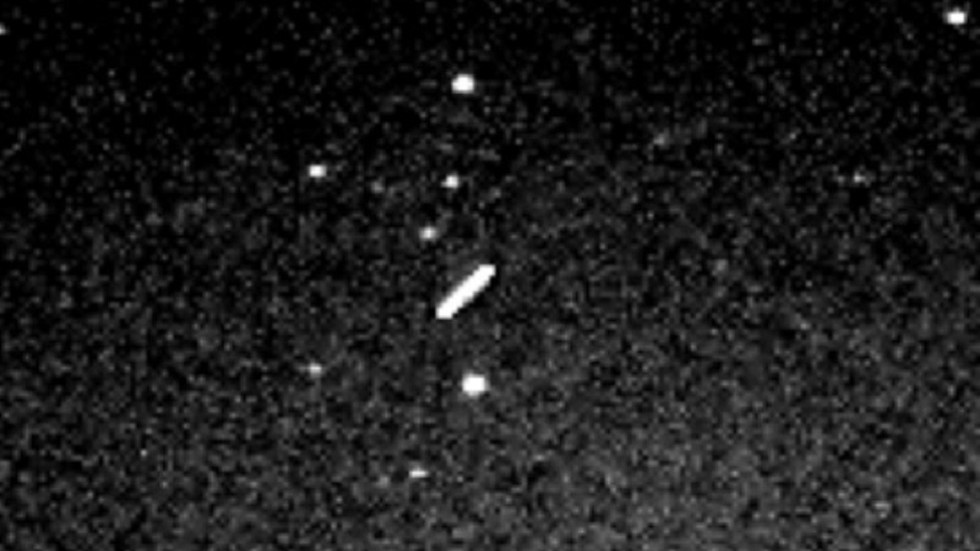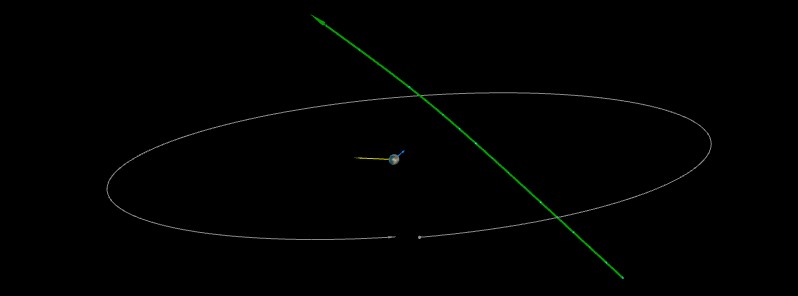The reporting about that one is very strange. Multiple videos and articles state that it would "pierce earth's atmosphere" or something like that, while at the same time stating that it will have a close-approach distance of ~3.4 million miles or ~5.5 million kilometers or ~14 lunar distances. I never heard that the moon is piercing earth's atmosphere even thought it is 14 times closer.
I think something like that most often can come from sloppy reporting/research at best, but I'm afraid more commonly from what I would call "clickbait Journalism" combined with extreme exaggerations. Which is something I distaste to no end when it is not based on any reality/facts. You see this kind of "Clickbait Journalism" everywhere nowadays, and especially on social media.
So I guess I have to rant about it:
What I call "Clickbait Journalism" that is not based on any facts and tends to greatly exaggerate things unnecessarily by using superlatives, most often starts already in the headline and/or the accompanying picture (and tends to be believed by people). The simple fact is that you can find a lot of those types of headlines/articles/content nowadays where those who create it don't really seem to care about actual reality and often have no scruples to flat out lie in order to get people to visit/click/share their side/content first and foremost. The other factor that plays into it is the fact that many of the headlines/articles/content you see on the web nowadays is simply a copy and paste job from that original "clickbait content" by people who don't actually check and/or correct what they are sharing. A good example of this is something I saw/read recently (among numerous other examples that you encounter constantly) where the headline stated something like "Huge demonstrations in Austria" accompanied by a picture of a big crowd. What tends to happen is that headlines clickbaits you. So I went and checked out the article and to my great annoyance there was no Demonstration at all! The article stated that they are
expecting a "huge demo" on the upcoming Saturday in Austria. In other words: the headline misrepresented reality. If those who created that headline would have some integrity or thought a bit, a little word such as the following would have made it more truthful and far less of a slimy "clickbait": "Huge demonstrations
expected in Austria". Big difference!
Which brings me to another point that very often goes along with those types of reports/headlines/articles/content and annoys me to no end. Namely, words and phrases such as "huge", "unbelievably huge", "earth-shattering" that tend to get used by people for content that is objectively speaking actually anything but those superlatives. I call those unnecessarily big/extreme exaggerations that tend to distort reality and dissolve actual comparisons, and therefore tend to make everything just trivial with little distinctions left between actual differences.
If everything is "huge", and quite frankly, those things are in reality just more or less ordinary in scale/magnitude, where does the real "huge" have any value anymore? If you call something "huge" or "earth-shattering" etc., the content should at least remotely reflect those stated superlatives in an objective way, IMO.
What happens for example if you call something like a 10-meter Meteor "huge"? (Which is something that I've seen on many websites!) What would you call a 100 Meter, or several Kilometer objects then? What words are left then to describe something that is truly and objectively big or huge then? How would you call it then? Also, huge? Or are there other superlative adjectives left that can reflect the much bigger nature of the 10 km object compared to the 10-Meter one? What words are left above "huge" to describe what is actually going on?
That is just one example of many in all areas. What happens if superlative adjectives are constantly used in reports/headlines/articles/content and by people themselves for things that are objectively nothing but those superlatives? Actual scale/magnitude and comparative differences lose their meaning/significance, and therefore everything just tends to become trivial and even meaningless in the minds of people. It also reminds me of the old fable of "
The Boy who Cried Wolf":
[...]
At one point in a recent podcast Carlson told about an article he wrote in 2014 called "
The Boy who Cried Wolf". He wrote that article after the (in many circles) anticipated Apocalypse that was supposed to happen in 2012. He basically summarizes that at least about 12 of such "end of the world" scares inflicted culture since the 1960 (he took note of every instance of that). The whole point of the article is the old Story of the Boy who Cried Wolf. As Carlson wrote:
We all remember the well-known fable told by the ancient Greek slave and storyteller, Aesop, about the shepherd boy drafted to keep watch over a flock of sheep, and who, out of boredom, decided it would be great fun to fool the nearby villagers by pretending that a wolf was attacking the sheep. After the villagers rushed out to save the sheep a number of times based upon the boys fabrications they refused to believe him when the wolf actually did show up and began to consume the sheep. The obvious declared moral of the story is generally expressed as “There is no believing a liar, even when he is telling the truth.” However, there is, I submit, a second, unstated moral to the story as well. In spite of the shepherd boy’s prevarications, the wolf was real. And the wolf did, in the end, show up to devour the poor sheep…
Bringing us to the point of this article: for centuries various predictions have been made about the end of the world on certain dates by assorted means, and on quite a number of occasions these predictions have been believed by a significant number of people. Obviously the world did not perish in late December of 2012 – the most recent date proffered in a long tradition of doomsday predictions that failed to materialize.
Randall's point being in that article, that what we experienced so far with all those Apocalyptic scares could be the Analog to the boy who Cried Wolf story, meaning that when a true Apocalypse might start to happen, no one will believe the foolish boy, who scared people before, fully knowing that he made it up, when the wolf (aka. Cataclysms caused by comets and such) really shows up.
So what happens if everyone constantly cries wolf about all and everything when the real wolves in whatever form in any area show up?
What are
Comparative And Superlative Adjectives, and why do people seem to have such a hard time to use the correct Adjectives nowadays?:
[...]
What are comparative adjectives?
Comparative adjectives are used to compare differences between the two objects they modify (e.g. larger, smaller, faster, higher). They are used in sentences where two nouns are compared:
Noun + verb + comparative adjective+ than + noun.
E.g. The cat ran faster than the dog.
[...]
What are superlative adjectives?
Superlative adjectives are used to describe an object that is at the upper or lower limit of a quality (e.g. the tallest, the smallest, the fastest, the highest).
In other words, they describe extremes. They are used in sentences to compare three or more nouns:
Noun + verb + the + superlative adjective + noun.
E.g. Parrots are the noisiest birds in the jungle.
[...]



 with ~1km size.
with ~1km size.
